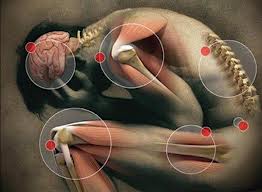Whether your pain has just come on or you’ve lived with it for years, these tried-and-tested self-help tips for pain can bring you relief.
Get some gentle exercise
Simple, everyday activity like walking, swimming, gardening and dancing can ease some of the pain directly by blocking pain signals to the brain. Activity also helps to stretch stiff and tense muscles, ligaments and joints, which can lessen pain.
It’s natural to be hesitant if exercise is painful and you’re worried about doing more damage. But if you become more active gradually, it’s unlikely you will cause any damage or harm. The pain you feel when you start gentle exercise is because the muscles and joints are getting fitter.
In the long term, the benefits of exercise far outweigh any increase in pain. Also, if you avoid exercise completely, the lack of activity could lead to other problems like stiff joints, weight gain, heart disease, osteoporosis, poor balance and falls.
Breathe right
Concentrating on your breathing when you’re in pain can help. When the pain is intense it’s very easy to start taking shallow, rapid breaths which can make you feel dizzy, anxious or panicked. Instead, breathe slowly and deeply. This will help you to feel more in control of the situation and will keep you relaxed and prevent any muscle tension or anxiety from worsening your pain.
Stay positive
Pain can make you tired, anxious, depressed and grumpy. This can make the pain even worse, making you fall into a downward spiral. Be more kind to yourself. Living with pain isn’t easy and you can be your own worst enemy by being stubborn, not pacing your activities every day and not accepting your limitations. Some people find it useful to seek help from a counsellor, psychologist or hypnotherapist to discover how to deal with their emotions in relation to their pain.
Distract yourself
Shift your attention onto something else so the pain isn’t the only thing on your mind. Get stuck into an activity that you enjoy or find stimulating. Many hobbies, like photography, sewing or knitting, are possible even when your mobility is restricted.
Share your story
It can help to talk to someone else who has experienced similar pain themselves and understands what you’re going through.Pain Concern, Action on Pain, Arthritis Care and BackCare all have telephone helplines manned by people with long-term pain, who can put you in touch with local patient support groups. The healthtalkonline and youthhealthtalk websites let you watch or listen to videos of other people’s experiences of pain.
Get some sleep
“Many people with chronic pain dread going to bed as that’s when the pain is worst,” says Heather Wallace from Pain Concern. But it’s important to try to stick to a normal sleep routine so you’ve got the best chance of sleeping through the night. Also, “sleep deprivation can worsen pain”, says Heather. Go to bed at the same time each evening, and get up at a regular time in the morning and avoid taking naps in the day. If sleep problems persist, see your GP.
Take a course
The Expert Patients Programme (EPP) is a free NHS-based training programme for people who live with long-term chronic conditions such as arthritis to develop new skills to manage their condition (and any related pain) better on a day-to-day basis. Many people who have been on an EPP course say they take fewer painkillers afterwards.
Socialise
Don’t let pain mean that you lose contact with people. Keeping in touch with friends and family is good for your health and can help you feel much better. Try shorter visits, maybe more often, and if you can’t get out to visit people, phone a friend, invite a family member round for a coffee or have a chat with your neighbour. Aim to talk about anything other than your pain, even if other people want to talk about it.
Relax
Practising relaxation techniques regularly can help to reduce persistent pain. There are many types of relaxation techniques, varying from breathing exercises to types of meditation. Ask your doctor for advice in the first instance. There may be classes available locally or at your local hospital’s pain clinic.


















When it comes to self help concerning your physical health, I think that consistency is one of the most important things. Doing a positive activity once won’t make much of a difference. If you can create positive habits that you do every day, or at least every week, you can start to see a positive change in your health. The first tip uses the word “everyday” for a good reason. Thanks for sharing!